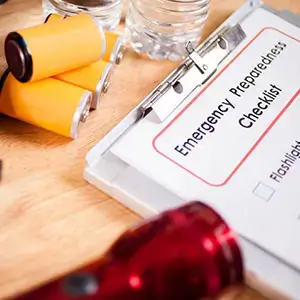
Hurricane Preparation Emergency Kit
A hurricane emergency kit is a lot like packing for a wilderness camping trip. You need to be able to survive for several days on your own without any outside assistance. The kit should consist of basic items and unique needs your family may have, such as medicines or supplies for pets. Below are a few tips we encourages you to read that will assist in ensuring your safety.
Tips on Preparing Your Emergency Kit
You can live for weeks without food, but only a few days without water, so store at least a gallon a day per person. In an emergency, it could take several days to get help, so plan accordingly. Water purification tablets and/or a water filter, will help extend your supply. Electrolyte solution and/or powdered sports drink take up little space and can be a life saver in hot, humid conditions.
Pack freeze-dried or canned food, enough for three days. Dense, high-calorie items are the best choice. A camp stove with extra propane will extend your menu options. Don’t forget a manual can opener. A mess kit, plastic eating utensils, and a lightweight camp cook set are a great addition if available.
Communication is key in any emergency situation, so pack a battery-powered or hand crank radio. If possible, get one with a NOAA Weather Radio option. Make sure you have extra batteries. A waterproof case for your cell phone and a solar charger may come in handy too.
Store your supplies and gear in a large plastic tote, or something that is durable and easily transportable. A cooler with wheels is another good option. Once you unpack your supplies, you have a place to store fresh food if you are lucky enough to find some ice.
Other supplies may include items such as:
- Medicine (prescription and non-prescription)
- Pet supplies (food, medicine, additional water)
- Battery operated lantern, flashlight, fan
- Insect repellent
- Pillow and sleeping bag
- Waterproof matches or lighter
- Moist towelettes, garbage bags, and plastic ties for personal sanitation
- Wrench to pliers to turn off utilities
- Maps
- Important documents
- Appropriate change of clothes for your climate
- Rain jacket or poncho and sturdy shoes
For a full list of kit items to consider, visit Ready.gov.
Propane users should be prepared to follow a few additional steps to make sure their tank, home, and business are secure. Should you and your face severe weather and flooding, shut off your propane tank by turning the gas supply valve in a clockwise direction. Once the severe weather and flooding has passed, call your local propane provider to get your gas reestablished safely.
To ensure your home is prepared for the storm:
- Properly secure propane tanks, if safe to do so
- Turn off the gas supply valve in a clockwise direction at the tank
- Turn off the appliance pilot lights, control valves, and manual shut-off valves
- Remember that propane tanks should NEVER be stored indoors
- Never use outdoor propane appliances or generators indoors or in an enclosed space
CLICK HERE to get more propane safety tips from Blossman.
For more information, contact your local Blossman Gas store.
